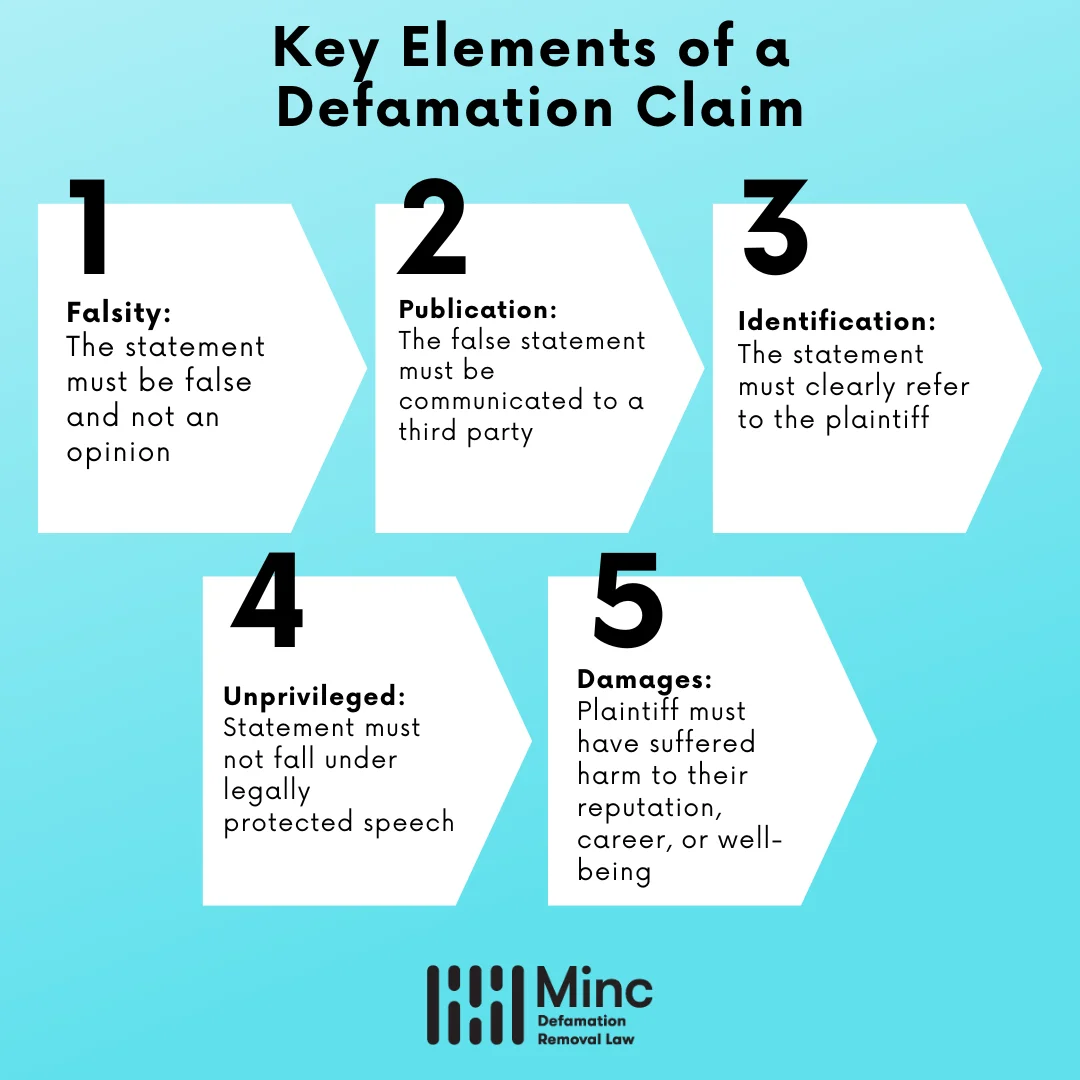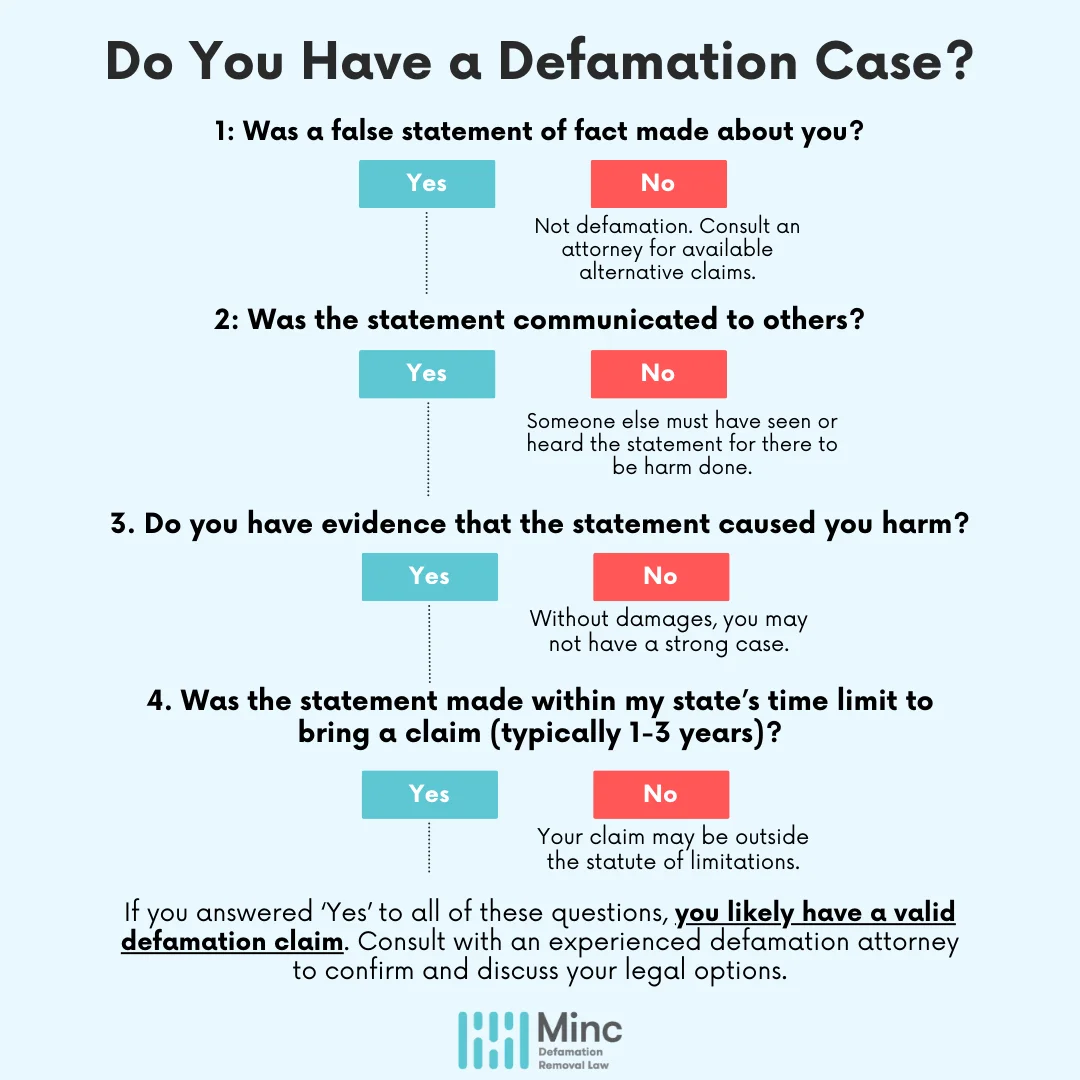
- Originally Published on June 14, 2024
Workplace Defamation of Character: What It Is, and How to Prove It
You’ve worked hard to build your professional reputation. But now, a co-worker or boss has made false and damaging statements about you to others. Your career and livelihood are on the line. I’m Aaron Minc, a defamation attorney and founder of Minc Law, the law firm responsible for pioneering internet defamation as a niche legal practice, I’ve helped countless clients in your situation take back their power and restore their good name.
In this article, I’ll explain exactly what qualifies as workplace defamation, what you need to prove a legal claim, and what you can do to get justice and move forward with your life and career.
What is Workplace Defamation of Character?
Workplace defamation of character occurs when someone makes a false statement of fact about another employee to a third party, harming their professional reputation. The statement must be demonstrably untrue, “published” or communicated to others, and cause actual damage to be legally actionable. Workplace defamation can take the form of libel (written defamation) or slander (spoken defamation).
Libel involves any false and damaging published statements, such as in:
- Emails or texts
- Performance reviews or personnel files
- Social media posts
- News articles
Slander refers to any false and damaging spoken statements, such as:
- Comments made in meetings
- Rumors spread to co-workers
- False accusations to HR or management
- Lies told to clients or vendors
What are the Key Elements of a Defamation Claim?

To pursue a successful workplace defamation lawsuit, you must prove the following key elements:
- Falsity: The statement made about you must be actively untrue, not just unflattering or mean. Truth is an absolute defense to defamation.
- Publication: The false statement must be “published,” meaning communicated to at least one person besides you and the defamer. The larger the audience, generally the greater the harm.
- Identification: It must be clear that the false statement is about you specifically, not just a general group you belong to. Slight name errors won’t nullify a claim if the audience understands it’s about you.
- Unprivileged: The communication must not be privileged, meaning the speaker had no legal right to say it. We’ll discuss common privileges later.
- Damages: You must be able to show the false statement caused real professional or financial harm, like getting fired or denied job opportunities. In some cases, the statement may be so egregious that damages can be presumed.
It’s important to note that the person making the false statement doesn’t necessarily have to know it’s not true. Negligently making a defamatory statement without verifying the facts first can still make them liable. And you don’t necessarily have to be named – if there are enough identifying details that people understand who the statement refers to, that can suffice.
Real-World Examples of Workplace Defamation
Let’s look at a few hypothetical scenarios to illustrate what workplace defamation can look like in practice:
Scenario 1: Passed Over for Promotion
John has worked as a sales representative at Acme Co. for five years with a stellar performance record. When a sales director position opens up, John applies. In the interview, the hiring manager says she heard from John’s current supervisor that he pads his numbers and takes credit for others’ work. When John objects that this is completely untrue, she says she’ll have to check into it further but ends up hiring an outside candidate. John is soon transferred to a dead-end role.
My Legal take: This scenario may qualify as workplace defamation. John’s supervisor made demonstrably false statements that harmed his professional standing and cost him a deserved promotion. His sudden dead-end transfer supports the damage element. John likely has grounds for a defamation claim against his supervisor and potentially the company. However, it would potentially be subject to a qualified immunity defense.
Scenario 2: False Accusations of Misconduct
Maria, a nurse at a hospital, had a brief consensual affair with a doctor she works with. After they amicably ended things, the doctor became very cold to Maria. He started telling other staff that Maria had sexually harassed him and was mentally unstable. He even filed a false complaint with HR. Maria was placed on leave pending an investigation. Rumors flew around the hospital and someone posted about the allegations on Facebook. Although the investigation cleared Maria of wrongdoing, the damage to her reputation was done. She had difficulty finding a new nursing job.
My Legal take: The doctor’s false allegations of misconduct to HR and co-workers may constitute workplace defamation. His statements were demonstrably untrue and were published to third parties, damaging Maria’s professional standing. The viral social media post further spread the defamation. Maria can likely sue the doctor for defamation and potentially pursue the hospital for not better protecting her confidentiality during the investigation. She may also have a claim against the Facebook poster if they can be identified.
Scenario 3: Overheard Lunchroom Gossip
Sam and Tina, two paralegals at a law firm, are eating lunch in the breakroom. Sam mentions he heard a rumor that one of the partners, Lisa, is a raging alcoholic who’s been coming in hungover and missing deadlines. Tina exclaims that she’s noticed Lisa seems out of it too. Lisa’s secretary Jane overhears the conversation and is horrified – she knows Lisa’s been stone-cold sober for a decade and has been missing work to care for her mother with cancer, not due to drinking. Jane immediately reports the incident to Lisa.
Legal take: Although Sam and Tina’s discussion was limited to each other, the fact that Jane overheard it counts as “publication” to a third party. Their statements were false and could damage Lisa’s standing at the firm if spread further. However, Lisa likely doesn’t have a strong defamation claim as there is a strong defense in this case that the statements were understood to be opinions. The other major hurdle would be showing real damage, like losing clients or her partnership status over the rumors. The best response is probably to address the gossip internally with the support of firm leadership. If the rumors do spread and cause harm, she may then have a stronger claim.
As these examples show, whether a statement rises to legally actionable workplace defamation depends on the specific facts and nuances of each situation. Consulting with an experienced defamation attorney is the best way to evaluate if you have a valid claim worth pursuing.
So.. Do I Have a Defamation Case? Ask These Questions

Proving Workplace Defamation: Evidence to Document
If you believe you’re being defamed at work, it’s critical to gather evidence to support your case. Some key documentation includes:
- Emails, texts, messages, and social media posts containing the defamatory statements
- Detailed notes of in-person defamatory statements, including direct quotes, witnesses, and the date/time/location
- Performance reviews, personnel files, and other records that contradict the defamatory statements
- Statements from witnesses who heard or saw the defamation
- Documentation of any professional or financial harm, such as lost job opportunities, demotions, or reduced hours/pay
- Copies of any complaints you filed with your employer about the defamation and records of their response (or lack thereof)
- Medical records or therapy notes reflecting the emotional distress caused by the defamation
- A journal documenting all incidents of defamation and their impact on you over time
The more contemporaneous and specific your documentation, the stronger your case will be. An experienced defamation attorney can help you identify and gather the most vital evidence.
Legal Remedies for Workplace Defamation
If you’ve been defamed at work, you have several potential legal remedies available.
Cease and Desist Letter: A cease and desist letter is a formal demand from your attorney to the defamer to stop making false statements about you, retract any prior statements, and not repeat them in the future. It puts them on notice that you are prepared to take legal action if the defamation persists. In some cases, a strongly worded cease and desist is enough to resolve the situation.
Defamation Lawsuit: If the defamation is severe or continues after a cease and desist, you may need to file a civil lawsuit against the defamer and potentially your employer. To prevail, you’ll need to prove the elements of defamation by a preponderance of the evidence. There are several types of damages you can recover:
- Economic damages for lost income and benefits, job search costs, and other quantifiable financial harm
- Non-economic damages for emotional distress, humiliation, and reputational damage
- Punitive damages to punish particularly malicious or reckless defamation
- Injunctive relief ordering the defendant to remove defamatory statements and barring future defamation
When considering legal action, it’s critical to be aware of the statute of limitations for defamation claims in your state. This is the deadline for filing a lawsuit. Most states have a limitations period of 1-3 years. If you miss the deadline, you lose your right to sue, no matter how egregious the defamation.
Responding to Workplace Defamation
In addition to pursuing legal remedies, there are other steps you can take to respond to workplace defamation:
| DO | DON'T |
|---|---|
| Document all instances of defamation (date, time, content, witnesses) | Retaliate against or spread rumors about the person defaming you |
| Report the defamation to your supervisor and HR in writing | Discuss the situation with co-workers, except to correct false statements |
| Stick to the facts when refuting false statements | Post about the defamation on social media or online forums |
| Maintain professionalism and composure in the workplace | Directly confront the person defaming you, especially alone or without seeking legal counsel fist |
| Preserve relevant evidence (emails, messages, posts, notes) | Admit to or apologize for any false allegations made against you |
| Seek support from trusted colleagues, friends, and family | Sign any documents related to the defamation without legal review |
| Consult with a therapist or counselor for emotional support | Allow the defamation to affect your work performance or attendance |
| Monitor your online presence and set alerts for your name | Make any major decisions (quitting, signing agreements) without legal counsel |
| Inform your attorney about any developments in your case | Threaten legal action or discuss your case with anyone except your attorney |
| Focus on your job duties and performance despite the situation | Let the defamation define you or damage your self-worth |
How an Experienced Defamation Attorney Can Help
If you’re facing workplace defamation, an experienced defamation attorney can be your strongest ally. They can:
- Evaluate the strengths and weaknesses of your potential legal claims
- Gather and preserve evidence to build your case
- Interview witnesses and obtain statements supporting your position
- Hire investigators to uncover the source and scope of the defamation
- Draft a powerful cease and desist letter to stop the defamation
- File a compelling complaint in court laying out your claims
- Aggressively negotiate with the defamer and your employer for a retraction and compensation
- Litigate your case in court and present a persuasive case to the judge or jury
- Pursue the maximum available damages to compensate you for the harm suffered
- Obtain court orders to remove defamatory content and gag the defamer
- Connect you with reputation management experts to repair your professional image
- Counsel you on rebuilding your career and moving forward from the defamation
You don’t have to navigate this difficult situation alone. An attorney can provide invaluable guidance, support, and advocacy to achieve the best possible resolution.
You Can Overcome Workplace Defamation. We Can Help.
Being defamed at work can feel devastating. But you don’t have to go through this alone. By understanding your rights and enlisting help, you can fight back against workplace defamation, clear your name, and get your career back on track.
At Minc Law, we’ve helped hundreds of clients hold defamers accountable and move forward with dignity. If you believe you’ve been defamed at work, we’re here to listen, advise, and advocate for you. Contact us today for a confidential consultation with an experienced defamation attorney. Together, we’ll develop a strategic action plan to vindicate your reputation and secure your future.
★★★★★
“I highly recommend the Minc Law firm. Not only were they knowledgeable, professional and timely in resolving my matter, but they were a pleasure to work with. Dan, Darcy and Melanie thank you for everything! My only regret was not engaging the firm earlier.”E
October 4, 2021
To get started, call us at (216) 373-7706, speak with a Chat representative, or fill out our online contact form.
This page has been peer-reviewed, fact-checked, and edited by qualified attorneys to ensure substantive accuracy and coverage.



